Stunned and honored, Dr. Brian Frink, associate professor of chemistry and physics, received the 2013 Underkofler Excellence in Undergraduate Teaching Award at the Honors Convocation this spring.
“I am humbled by the fact that students think that I do a good job as well as my colleagues. I just try to do my best and so I didn’t expect to ever win any award,” said Frink.
Dr. Elizabeth Stroot, division chair of social sciences and associate professor of psychology, presented the award to Frink.
In introducing Frink as the winner, Stroot said, “He is a master not only of the subject matter, but a master at articulating the complexities of the discipline in clear and simple language.”
Surprised to hear his name spoken at the end of Stroot’s speech, Frink explained, “When Dr. Stroot was speaking, you sit there and you go, ‘Oh, I wish I did that,’ or, ‘Man! I should be taking notes, so I can be doing that in my classes.’ And that’s not just this time, it’s every time you hear that [introductory speech].”
Frink says, “I don’t think we [faculty] really realize what we are doing. You are just doing it because it is the right thing to be doing. It’s what the student needs at the time. You don’t think about how it is seen by your peers, by the student, or by anybody else. You’re just doing it.”
According to Stroot, Frink teaches outside the classroom more frequently than he teaches inside the classroom. Nearly every day, Frink interacts with his students in his office or in the lounge located on the second floor of Chase where he pushes students to think outside the box.
Lindsay Biter, English and biology major, said, “I think he is an outstanding teacher who devotes way too much of his time to helping students.”
Frink’s students describe him as being relatable, prepared, intelligent, straightforward, and giving.
“There are very few professors I know who are willing to give as much time and effort for as little reward [as he gets],” said Biter in explaining why Frink deserved the Underkofler Award.
However, Frink is not of the same opinion as Biter.
“I truly don’t think the award is a faculty award. Students deserve the award. Without hard-working students, I would just be standing up there [in front of class] making lots of noise,” said Frink.
The plaque, however, is not what moved Frink the most.
“What really touched me is they also gave me the letters that the students had written. That was way more valuable as an award than the plaque ever will be,” said Frink.
For this reason, Frink is hesitant to ever place the plaque up in his office. Rather than draw attention to his hard-earned diploma of six years’ labor, Frink proudly shows off his CORE classes’ art projects.
Frink even compares teaching to parenting. “You give an 18 year old the means to be a functional member of society, give them those skills and you let them go. They are our children. I often refer to students as kids for that exact reason, not because they are young, and not because I don’t think they are adults.”
This is the reason why Frink often stresses to his students, “I am not here to teach you but to help you learn.” To Frink, “Successful teaching means that the student has learned.”
Frink is also known by his students and co-workers for having a wonderful sense of humor and an upbeat personality. Stroot says that Frink smiles and laughs often and is frequently in a good mood.
Although Frink may have a good sense of humor, it is his dedication to helping students learn that not only nominated him but awarded him with the Underkofler Excellence in Undergraduate Teaching Award.
Deborah Mahaffey, senior vice president for educational services for the Wisconsin Association of Independent Colleges and Universities, described this award as being designated to those who reflect the college’s “mission, purpose, and commitment to provide the very best in undergraduate education,” as well as demonstrate excellence as a habit.
Mahaffey said, “It’s not one single heroic activity, but rather a high standard of performance that’s demonstrated day in and day out.”
After all, Stroot said, “Teaching is Brian’s normal state of being. It’s what he does. It’s who he is.”


